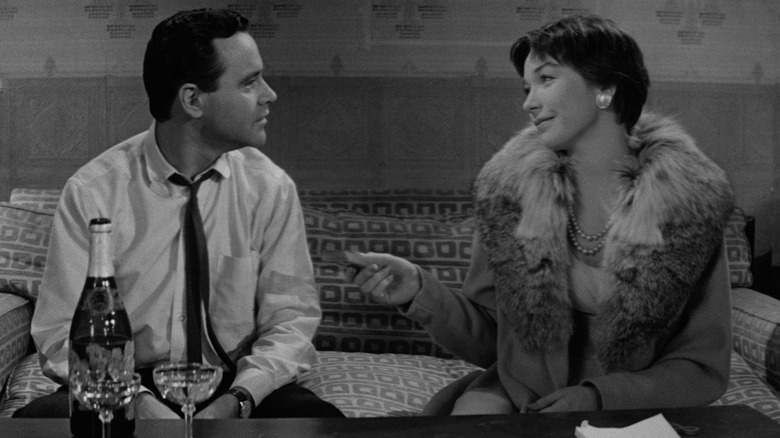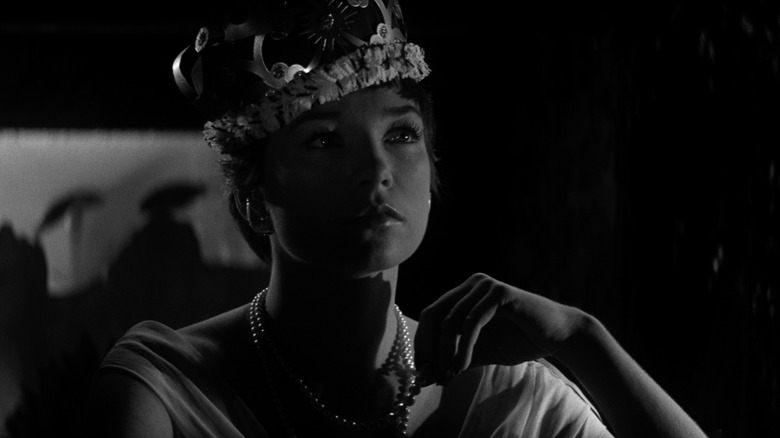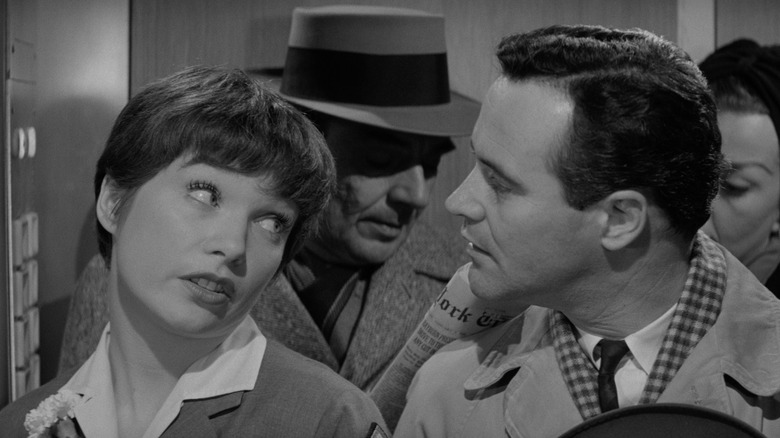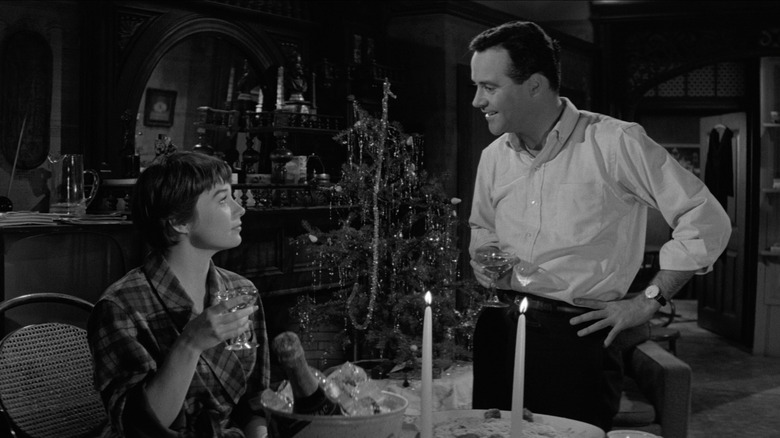The Apartment Ending Explained: Shut Up And Deal
Few directors nail endings as well as Billy Wilder, with even fewer (perhaps none) as consistently. The director's best films all culminate in a line or a moment that makes your heart soar into the sky or sink to the bottom of the ocean. From Norma Desmond's haunting and frequently misquoted, "All right, Mr. DeMille. I'm ready for my close-up," from "Sunset Boulevard" to the one-two punch of "I'm a man,"/"Well, nobody's perfect," to cap off "Some Like It Hot," Wilder's penchant for finding the perfect bow to tie everything up in truly is unparalleled. The "Some Like It Hot" ending may be the one enshrined on his gravestone, but for my money, the ending that plays on a loop inside my head comes from "The Apartment," a film that, on certain days, I would call my favorite.
"The Apartment" won Wilder Best Director (for the second time) and Best Screenplay (for the third time) at the Oscars, and it ends with four simple words that cause the biggest smile to be slapped across your face: "Shut up and deal." Those four words delivered by the legendary Shirley MacLaine are the apotheosis of catharsis. They are a triumph of fully understanding a character on the page, knowing exactly how they would respond to every situation. Plus, it's just a whole lot more fun than simply saying four other words, "I love you too."
Humor as Defense
Fran Kubelik, the elevator operator played by Shirley MacLaine, is a young woman with a lot of pain. She has to deal with the daily sexual harassment and ogling from executives at her office and is in love with head honcho Jeff Sheldrake (Fred MacMurray), a married man who sees her as nothing more than a vessel for sex. I mean, he gives her cash as a Christmas present. Cash. The only person who she has regular, decent interactions with is C.C. "Bud" Baxter (Jack Lemmon), but she thinks so poorly of herself that she finds herself charging back into bad situations time and again. "Why can't I ever fall in love with someone nice like you?" she even asks him. All of this pain leads to a suicide attempt, where Bud is tasked to look after her in the aftermath.
Like many people dealing with mental health and personal issues, Fran uses humor and euphemisms to talk about her feelings, delivering poignant sentiments wrapped up in clever quips. When Bud remarks upon her broken compact mirror, she comes back with, "Yes, I know. I like it that way. Makes me look the way I feel." During a particularly heated argument with Sheldrake, she remarks, "When you're in love with a married man, you shouldn't wear mascara." Fran thinks that by diverting her true problems into these cleverly constructed aphorisms, she can bear the pain a little easier, which only makes it build to the dramatic turn where she tries to take her own life.
With the closing line of, "Shut up and deal," she can finally turn that style of obfuscation into a positive. This line is in response to Lemmon's Bud pouring out his heart by saying, "I love you, Miss Kubelik. Did you hear what I said, Miss Kubelik? I absolutely adore you." Committing herself to a definitive, "I love you too," would have felt completely out of character for Fran. She does not commit that quickly to something. "Shut up and deal," comes from the exact same emotional place and it's the kind of quip she would deliver in that moment. The simple act of starting up the game of gin rummy they played while she was recovering from her suicide attempt is an act of love for her. That placed alongside Bud's overly earnest, no filter adoration perfectly captures these two people as we have seen them for the last two hours and gives them the happy ending we so desire.
Get Out While the Getting's Good
One thing that makes Billy Wilder so incredible at writing endings is his ability to know exactly when to pull the plug. How many movies have you seen where it feels like the movie should end at a certain moment, but for some reason or another, it keeps going into this weird epilogue space that gives us nothing new for the story? Wilder does not do this. We get the climax of the story, a line that wraps everything up, and that's the end, fade out. You get to leave the movie at an emotional peak, where your mind and body are buzzing as you exit the theater. He never gives you the chance to think, "Okay. Wrap it up."
So few filmmakers adhere to this kind of storytelling when crafting their endings. They can't resist the urge to over-explain or just don't understand where the core climax of their story is. This is particularly an issue with modern action blockbusters. For example, "Shang-Chi and the Legend of the Ten Rings" has a core battle between father and son that provides the resolution to the story, and then there's still a whole other less interesting obstacle to deal with that takes another 15 minutes. True, "The Apartment" and "Shang-Chi" don't have much in common in form or content, but in their respective times, they are meant to be massive Hollywood, crowd pleasers ("The Apartment" and "Shang-Chi" were both in the top ten of the box office their release years). What better way to please a crowd than by leaving them on a high?
That's the Way It Crumbles, Cookie-wise
Though Billy Wilder knew how to end his films on just the right note, this was not true of his career as a whole. "The Apartment" was Wilder's final true blue masterpiece, in a career that had already produced several. The rest of his career was a hodgepodge of pretty good movies like "One, Two, Three" and "The Fortune Cookie," misfires like "The Front Page," and the perplexing "Irma La Douce," which would reunite Wilder with Jack Lemmon and Shirley MacLaine. Seriously, if you have not seen "Irma La Douce," check it out. Nothing much like it. Ironically, what became an issue for him post-"The Apartment" was his films felt "overlong." This is how Variety described "The Fortune Cookie" and The New York Times described "Avanti!" Obviously, it is impossible to know when you have made your final masterpiece, but it would have been remarkable if he had.
Nobody's perfect, but Billy Wilder made a handful of perfect films with perfect endings, and for me, "The Apartment" stands as above them all. It finds the right balance of wit, heart, and truth to deliver an ending that is beyond earned. It's the tops, movie-wise, ending-wise, and otherwise-wise.



